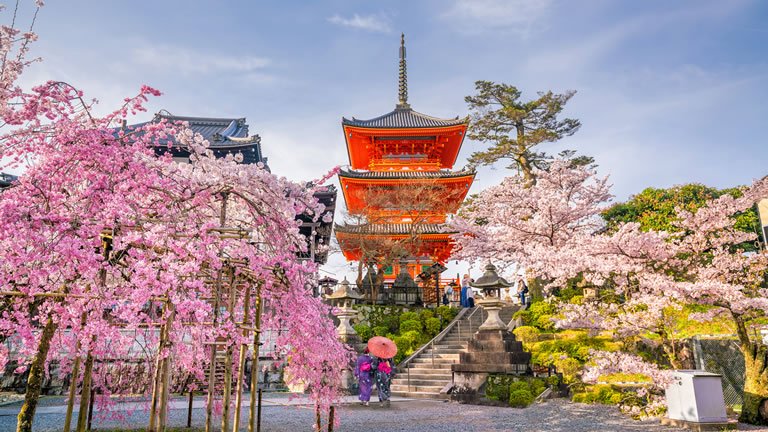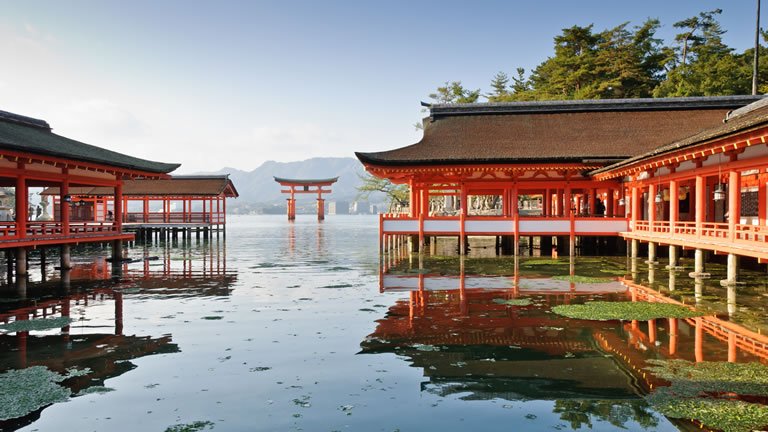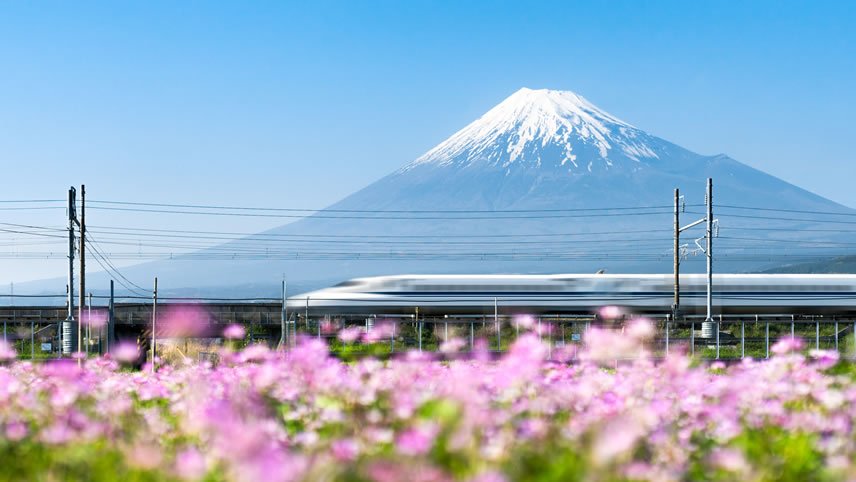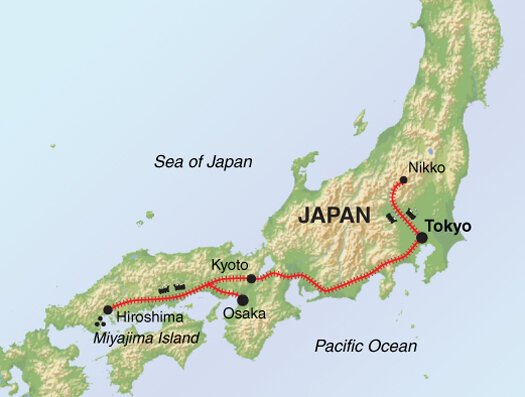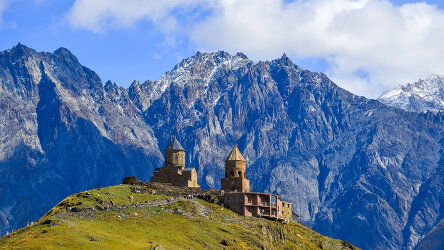Overview
Itinerary
The trip begins this afternoon in Tokyo, the futuristic capital of Japan.
At 6pm, we have a group welcome meeting with the tour leader followed by an optional group dinner and casual tour around Shinjuku, the nightlife district of Tokyo. Stay: Dormy Inn Kodenmacho (or similar).
Today we utilise the efficient Tokyo metro system and enjoy a full-day city tour. We start with an early morning visit to Meiji Shrine, the most famous in the city and dedicated to the spirit of the late Emperor Meiji. The surrounding park is a forest of some 120,000 trees of 365 different species, making you forget you are in the most populated city in the world. Outside of Meiji Shrine is Harajuku, a shopping haven for fashionistas and the popular meeting place for teenagers who are usually in eccentric clothing.
The landmark of Harajuku is Takeshita Street, a long alley filled with boutiques, shops and cafes. Neighbouring Harajuku is Omotesando, commonly referred to as the Champs-Elysée of Tokyo. This broad, tree-lined avenue features several flagship fashion stores designed by internationally renowned architects. From Omotesando, we can take the metro to Ginza, one of the most famous upscale shopping, dining and entertainment districts in the city. It is said that 11sqft (1sqm) of land in Ginza is worth more than 10m yen (US$71,540).
Our last stop Asakusa, the oldest Geisha district in Tokyo and home to Senso-ji Temple, the oldest Buddhist temple in the city. The streets around Senso-ji have many traditional shops that sell Japanese crafts and souvenirs – a delight to wander through. Please note, the order of activities and areas visited today may change depending on the weather conditions and other factors. Your tour leader will provide full details of the schedule during the initial trip briefing. Stay: Dormy Inn Kodenmacho (or similar) (B).
After breakfast, we bid farewell to Tokyo and travel by train (approximately two hours) to beautiful Nikko, known for towering cedar trees and Unesco World Heritage sites, such as the Toshogu Shrine.
Upon arrival, we visit a few of the most popular sites. The Shinkyo Bridge is one of the most iconic landmarks in Nikko. This bright, vermillion bridge spans a river on the outskirts of the main shrine complex and is (aside from Toshogu Shrine) the most photographed attraction in Nikko. Often featured in traditional Japanese art prints known as ukiyoe, it is considered one of the most beautiful bridges in Japan and is photogenic in all seasons.
No visit to Nikko would be complete without a visit the Toshogu Shrine, which was built as a mausoleum for Tokugawa Ieyasu, founder of the Tokugawa Shogunate who ruled Japan for more than 250 years. This lavishly decorated shrine complex consists of more than a dozen Shinto and Buddhist buildings in a beautiful forest setting. We spend the night in Nikko in a traditional-style guesthouse. Stay: Turtle Inn Nikko/Annex Turtle Hotorian (or similar) (B/D).
Today we set out on a longer journey (approximately 4hr 30min) west to Kyoto, the former capital of Japan, by local train and shinkansen. As we arrive in Kyoto after 2pm, we can enjoy a bento lunch on the train. After checking into our hotel, we visit Nishiki Market, where we embark on a tour that will delight our senses. We walk through the narrow, covered food markets, where there are many interesting food shops to explore. This is a great opportunity to learn about Japanese produce and snap some photos of goods you won't find back home. Some of the shops give out or sell samples, so leave space in your stomach.
The late afternoon is the best time to visit the Gion district, also known as the Geisha District for being one of the hanamachi (flower towns) where Geisha live and work. The highlight is Hanami-koji, the most popular street in Gion where lavish teahouses and machiya (old houses) are lined up. In the early evening, you may see a Geiko or Maiko on the way to her engagement. Stay: Resol Kyoto Shijo Muromachi (or similar) (B).
Today, along with your tour leader, enjoy an exploration of the Kyoto highlights while using the comprehensive bus and metro systems. The tour starts with an early morning visit to one of the most unusual Shinto shrines in Japan. Fushimi Inari is composed of thousands of vermilion torii gates following trails inside the forests of Mount Inari.
The Shrine, which was featured in Memoirs of a Geisha, is famous for the impressive contrast and mystical atmosphere created by the colours of the torii gates and the surrounding nature. Next on our schedule is Arashiyama, one of the richest areas in Kyoto for sightseeing, which contains some of the most stunning scenery in the area. Starting at Togetsukyo Bridge, a local landmark, we make our way to the bamboo forest path on the west side of the river before stopping at Nonomiya Shrine.
After a lunch break, we continue to the serene Ryoan-ji Temple, which has a well-maintained rock garden. Nearby is the stunning golden pavilion collectively known as Kinkaku-ji Temple. The temple grounds are relatively smaller than that of most temples and shrines in Kyoto but what is undoubtedly impressive is the pavilion completely covered in handmade gold leaves. Stay: Resol Kyoto Shijo Muromachi (or similar) (B).
Following breakfast, we move further west by Shinkansen to Hiroshima (approximately three hours). Along the way, we break our journey to visit one of the most beautiful castles in Japan, Himeji Castle. Also called Shirasagi-jo (the White Heron Castle) or Hakuro-jo (the White Egret Castle), it resembles a white bird in flight with a white exterior and distinctive roof design.
After, we pick up lunch to enjoy on the train and continue to Hiroshima. Perhaps more than any city in the world, Hiroshima is famous for one moment in history; on 6 August 1945, it became the first target of an atomic bomb. However, Hiroshima has risen phoenix-like from its ashes, and rebuilt itself as one of the most laid back and vibrant cities in Japan, full of wide boulevards and museums and famous for great food and welcoming people.
This afternoon, we visit the Peace Memorial Museum for a sobering reminder of the events of 1945 before experiencing the surrounding Peace Park, where the atmosphere is one of hope and peace. We spend the night in Hiroshima. Stay: Daiwa Roynet Hotel Hiroshima Ekimae/Hotel Vista Hiroshima (or similar) (B).
This morning, we take a short ferry trip to Miyajima, a wooded island in the Inland Sea near Hiroshima. Here is, perhaps, the most photographed site in Japan: the Floating Torii Gate. Please note, while the floating tori of Itsukushima-jinja Shrine is currently undergoing renovation works, we still recommend a visit to this enchanting island.
Deer roam freely and we spend time at leisure before we make our way by Shinkansen (approximately 2hr 30min) to our final destination, Osaka. The second-largest metropolitan area in Japan, Osaka has a distinct, vibrant character. The residents are lively and known to work hard and play hard. Osaka is also known as the shopping, dining and nightlife capital of Japan. It's a good place to buy souvenirs and enjoy our last dinner together or sing in a karaoke box before heading home. Stay: Karaksa Hotel Grande Shin-Osaka Tower (or similar) (B).
The tour ends this morning after breakfast. If you have a late flight or are staying longer, your tour leader will happily give suggestions for your sightseeing plans (B).
Trip Inclusions
- Discover the iconic cities of Tokyo, Kyoto, Hiroshima and Osaka
- Enjoy the natural beauty and Unesco sites of Nikko
- Experience cherry blossom season or beautiful autumn colours
- Take the high-speed Shinkansen bullet train
- Taste a variety of Japanese cuisine
- 7 Classic nights (6 hotel, 1 traditional guesthouse)
- Sightseeing on foot and public transport
- Travel by train, local bus, metro and ferry
- Cherry blossom and autumn colour departures
- All breakfasts and one dinner
- All transport and listed activities
- Itinerary and inclusions are subject to change
- Price is for land, cruise and internal flights as specified. Flights not specified are not included
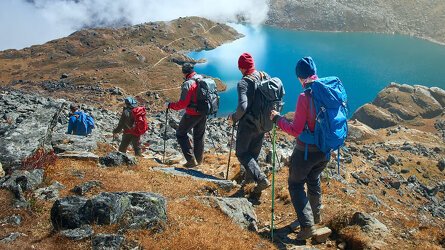
From classic small group tours & family adventures, to walking holidays, cycling trips and self-guided tours. Read more
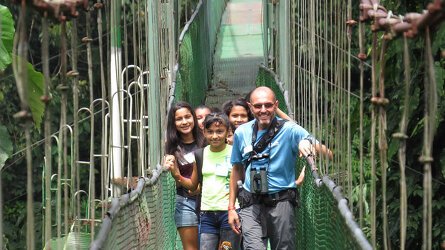
Exodus chooses their Leaders carefully. Professional, dedicated and are passionate about sharing their home countries. Read more
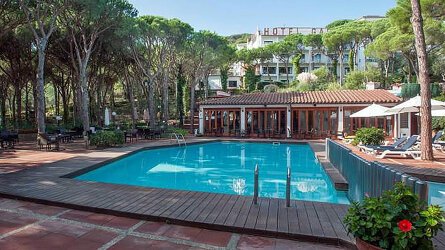
Wherever possible, Exodus chooses properties that are locally owned and that reflect the area you are visiting. Read more
Availability
 USD
USD
A definite departure means minimum numbers have been reached for this departure to operate. Your Global Journeys Travel Advisor will check the availability of your departure date when you enquire. Additional savings may apply. We guarantee the lowest price in USA. T&C’s apply.
Tour & cruises prices are per person. Prices shown have savings applied, are subject to availability and may be withdrawn at any time without notice. Pricing and trip details are correct at this point in time, however are subject to confirmation at the time of booking and are subject to change by Exodus. For cruise itineraries, cabin images are sourced from Exodus. These should be treated as indicative only. Cabin inclusions, upholsteries and room layout may differ to the image(s) shown depending on the ship selected and your sailing dates.
